0 2 3




0 2 3



Noah Aschemeier
Impacts of Climate Change Across Kenyan Communities
Maria Zaki
Who are you without systems?
Mercy John
Community Change: Leaving
Female Genital Mutilation
Kathryn Hay
Assessing the Impact of Women’s Table Banking Initiatives on the Achievement of the Sustainable Development Goals (SDGs)
The Human Rights Center, in collaboration with Dandelion Africa, offers the Kenya Applied Research Practicum, a ten-week summer immersive program
This practicum provides undergraduate students with research and fieldwork experience, focusing on development and human rights issues in Kenya. Students conduct individual research projects based on community-identified needs, supported by Dandelion Africa's work in improving sexual and reproductive health and economic livelihoods in rural Kenyan counties.
Dandelion Africa is a female-led grassroots organization that is locally-led, rooted, and deeply embedded in their communities.
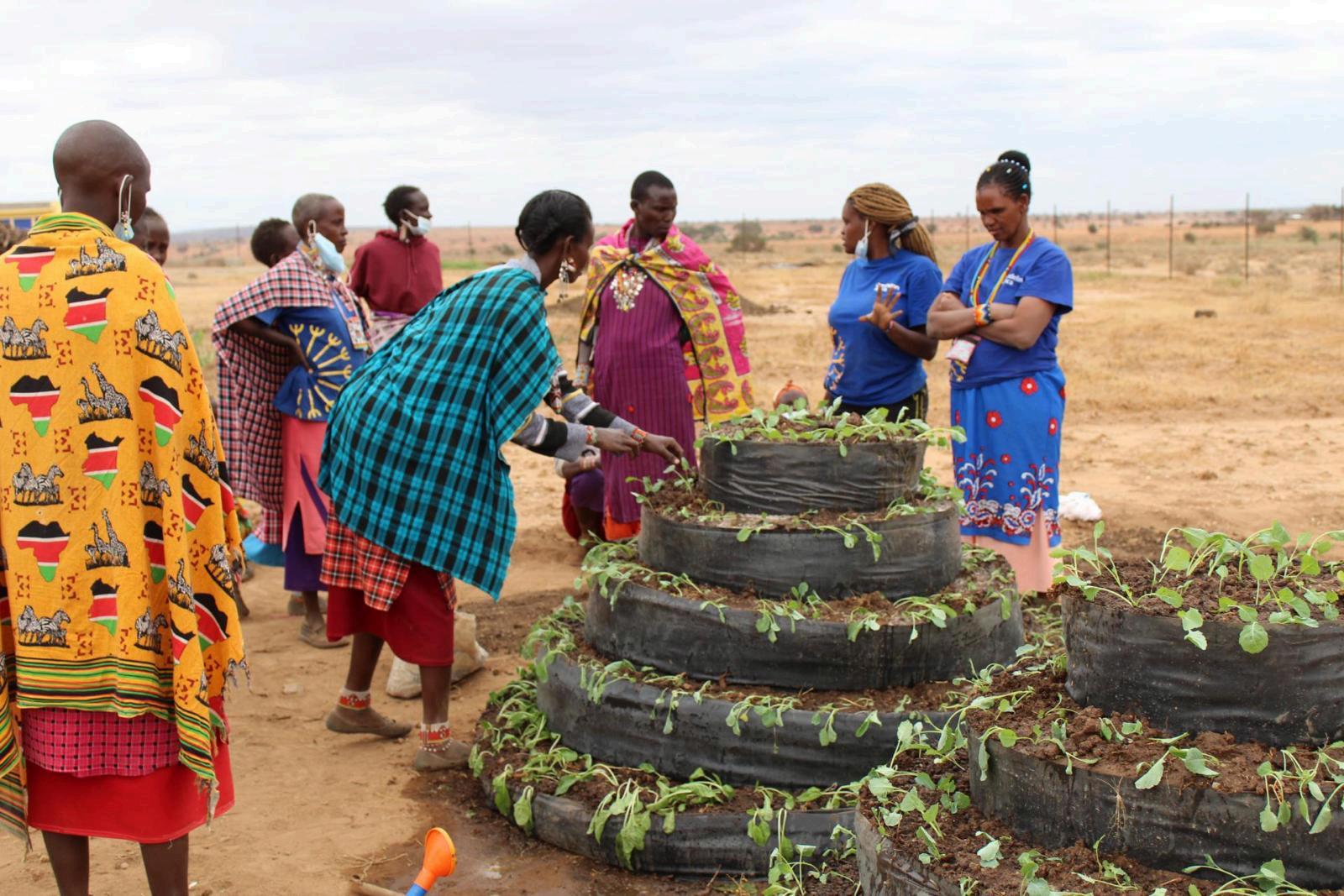
In 2023, four students from the Human Rights Center (Noah, Mercy, Maria, and Katie), along with two Ethos students (Caitlin and Rebekah), participated in the Kenyan Applied Research Practicum from May 20th to July 28th. The cohort immersed themselves in Dandelion Africa's work, accompanying backpack nurses teaching computer skills in schools sitting in on the table

Noah Aschemeier
This study examined the impacts of climate change on four Kenyan villages Mogotio, Koyumtich, Molo, and Kajiado emphasizing its intersection with human rights. Using qualitative methods, it captures residents' experiences, highlighting the vulnerabilities they face as climate change disrupts livelihoods and ecosystems.
Climate change, driven by human activities and natural processes, has become a global crisis with far-reaching consequences. In Sub-Saharan Africa, informal settlements are disproportionately affected, with Kenya experiencing frequent droughts, flash floods, and agricultural challenges. These hazards threaten the rights enshrined in the Universal Declaration of Human Rights (UDHR). Articles 3, 17, and 25, which guarantee life, property, and adequate living conditions, are directly compromised by climate-induced food insecurity, unsafe shelter, and health risks.
The study aimed to document climate challenges, compare issues across the four villages, and propose mitigation strategies. It underscores the urgent need for adaptation and innovative solutions to combat climate-related damages. While providing valuable insights, the study’s scope was limited by linguistic challenges and a lack of male participants, as it primarily engaged with women through Dandelion Africa, an NGO focusing on women’s empowerment.
Despite diverse solutions, the study finds striking similarities in issues faced, underscoring the widespread urgency of addressing climate change and implementing effective, community-driven interventions.
Research was conducted in four Kenyan villages Mogotio, Koyumtich, Molo, and Kajiado selected due to Dandelion Africa’s presence. Qualitative data was gathered through focus group discussions involving 34 participants, who answered seven climate-focused questions. Despite time constraints, the discussions yielded diverse, unfiltered perspectives.
Each village’s unique climate challenges were analyzed. Mogotio faces inconsistent rainfall, causing floods and drought. Koyumtich experiences erratic rainfall patterns, leading to hazards. Molo, near the Mau Forest, benefits from high rainfall, supporting agriculture. Kajiado suffers from scarce vegetation and irregular rain, resulting in water scarcity for both people and livestock.
The study utilized focus groups for collective responses, non-participant observation to understand dynamics, and photography to document findings. These methods provided a comprehensive understanding of climate challenges in the region and their impact on local communities, forming a basis for exploring the relationship between climate change and human rights.
The study highlights shared and unique climate change challenges across Kenyan communities. Inconsistent rainfall emerges as a key issue, impacting agriculture, livestock, and water access. While Mogotio, Koyumtich, and Molo emphasize agricultural struggles, Kajiado focuses on livestock challenges due to its pastoralist nature. Deforestation and droughts are seen as major contributors, with planting trees widely proposed as a solution Additional community-specific solutions include irrigation systems, hardier crops, government micro-level support, and communal aid groups.
There is an urgent need for actionable steps for Dandelion Africa and Kenyan communities to address climate change. Key solutions include planting trees despite challenges like inconsistent rainfall and irrigation through innovative techniques like cone gardening, which enhances crop production and economic security. Installing water tanks can support irrigation in droughtprone areas. Climate change education is emphasized as a transformative tool to foster sustainable practices across generations. Future research should focus on climate impacts on marginalized groups, such as individuals with disabilities, adopting a rights-based approach for inclusive data and solutions.
Dandelion Africa’s ongoing efforts, coupled with increased funding and collaboration, remain vital for climate change mitigation in Kenya.

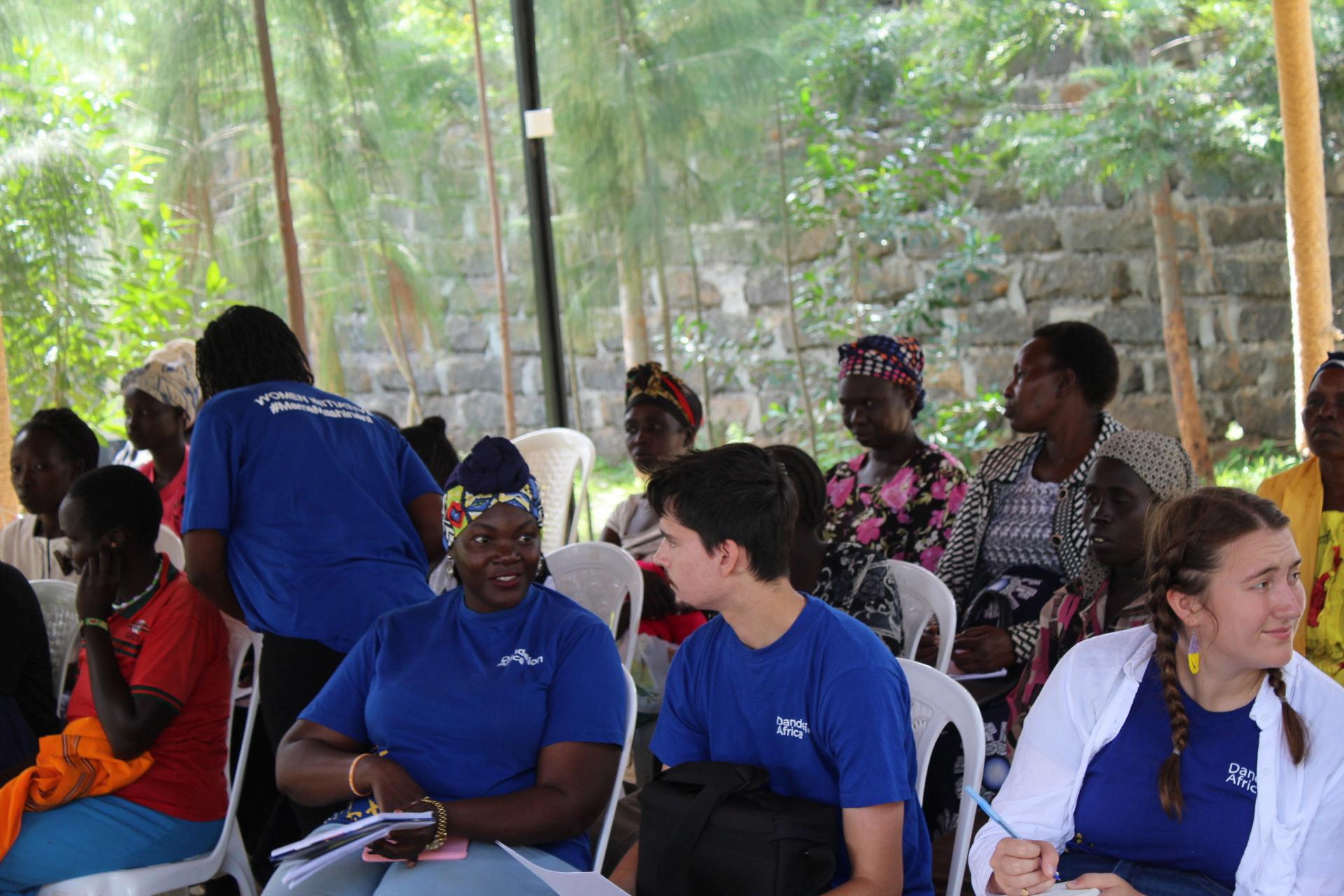
Climate change in Kenya threatens the rights to life, property, and adequate living conditions, with vulnerabilities like food insecurity and unsafe housing exacerbated by inconsistent rainfall and environmental degradation.
Villages face unique climate challenges, which warrants solutions like tree planting, innovative irrigation (e.g., cone gardening), and water tanks proposed to enhance agricultural and economic resilience.
Prioritize climate education, include marginalized groups in future studies, and enhance funding and collaboration to scale Dandelion Africa’s efforts in climate change mitigation and sustainable development.
Maria Zaki
This paper, based on collaborative action research, examines the various factors influencing the life trajectory of Orphans and Vulnerable Children (OVCs), with a focus on Kenyan school systems and the barriers faced by these children. It emphasizes the importance of preventative measures to address challenges early, as children only have one chance to build a fulfilling life.
The United Nations Sustainable Development Goals (SDGs) are used as a framework, particularly Goals 3 (Good Health and Well-Being), 4 (Quality Education), and 5 (Gender Equality), which are crucial in improving the conditions for OVCs. The research defines different categories of orphanhood, including double orphans, single orphans, social orphans, unaccompanied children, and vulnerable children, and highlights the specific needs and challenges faced by each group.
Key findings from various studies are presented, including the benefits of caregiver support groups in improving family dynamics and child well-being, as well as the importance of economic empowerment programs for OVC households.
Additionally, the lack of healthcare access for OVCs is discussed, with evidence suggesting that increasing household income alone is not enough to reduce healthcare disparities; improvements in food security, water access, and literacy are also essential. Recommendations for improving OVC support include the development of caregiver support groups, tailored business courses for youth, and enhanced access to quality healthcare and education. The role of NGOs, particularly those focused on family strengthening and economic empowerment, is also emphasized.
The research employed a combination of collaborative action research and technical action research, with a focus on engaging Orphans and Vulnerable Children (OVCs) in Kenya. Initial observations were followed by the creation of business cards to distribute key information on health and life skills to OVCs. Key activities included celebrating the Day of the African Child with a presentation on online safety and engaging OVCs in a series of interactive exercises.
Despite challenges such as language barriers, initial student apprehension, and limited access to a diverse group of orphans, the research provided valuable insights into their experiences and needs.
The findings from the MBTI Personality Test show that the individuals analyzed are predominantly categorized as Extraverted, with strong preferences for Feeling over Thinking, and Judging over Perceiving. The majority of participants are identified as Protagonists (ENFJ), with one individual falling under the Advocate (INFJ) and another as Adventurer (ISFP).
These results indicate a tendency toward empathetic and social behaviors, with a focus on community-oriented roles and emotional intelligence. The research suggests that improving educational access and support for OVCs (Orphans and Vulnerable Children) in rural Kenya could greatly benefit their academic engagement and retention. Recommendations include providing school supplies, advocating for gender equality, and addressing child labor to improve school attendance.
Additionally, community support for the elderly and a reduction in child labor could positively impact education outcomes. Interviews and questionnaires revealed that OVCs often face socioeconomic challenges, with limited access to income-generating skills and few stable job opportunities for their guardians. Gender-based violence (GBV) awareness was strong, and while sexual reproductive health (SRH) knowledge varied, many students expressed interest in learning income-generating skills.
The "Privilege Walk" activity provided valuable insights into OVCs' perceptions of privilege and marginalization, fostering empathy and self-awareness among participants. Administrative responses from Kalesirwa Primary School highlighted limited resources but pointed to the importance of community involvement in supporting OVCs.

OVCs in Kenya face challenges such as limited access to education, healthcare, and economic opportunities. Addressing child labor, gender-based violence, and the lack of income-generating skills for guardians is crucial for improving their wellbeing and educational outcomes.
Caregiver support groups and economic empowerment programs are vital in improving family dynamics and OVCs' lives. Empowering caregivers and providing youth with skills can enhance food security, healthcare access, and educational engagement for OVCs.
Community involvement and NGO support are essential for OVCs. Efforts to reduce child labor, promote gender equality, and improve access to healthcare and education can significantly impact OVCs’ life trajectories NGOs focused on family strengthening play a key role in addressing these challenges.
Female Genital Mutilation (FGM) involves procedures altering female genitalia for non-medical reasons and is classified into four types by WHO. It remains a global issue affecting over 200 million women, with the highest prevalence in Africa, especially Somalia, Guinea, and Djibouti. In Kenya, 4 million women have undergone FGM, with rural, poorer, Muslim, and uneducated populations most affected. COVID-19 exacerbated FGM by disrupting protective structures like schools and safe houses.
FGM has deep cultural roots, viewed as a rite of passage and tied to marriage eligibility, family honor, and religious beliefs. However, it poses severe health risks, including infections, childbirth complications, and psychological trauma Traditional and medicalized FGM continue, with gaps in Kenya's enforcement of anti-FGM laws. Despite robust legal frameworks, including the 2011 FGM Act and related laws, challenges such as judicial leniency, resource shortages, and cultural resistance hinder eradication.
Research focuses on alternative rites of passage and addressing community readiness to abandon FGM. Efforts must incorporate ethnic, cultural, and gender dimensions while strengthening legal measures and community-based interventions.
This study focused on four counties in Kenya’s Great Rift Valley region: Kajiado, Nakuru, Narok, and Baringo. Participants included 29 individuals: duty bearers, trainers, community health volunteers (CHVs), and an FGM survivor Semistructured focus group discussions and one-on-one interviews were conducted in safe community spaces, such as TOT forums and health service sites.
Data was collected in Swahili and Maa, transcribed, and analyzed for thematic patterns. Ethical considerations included anonymity, confidentiality, and culturally sensitive questioning. Limitations included a small sample size and time constraints, while collaboration with Dandelion Africa ensured cultural relevance and respect for sensitive issues.
FGM persists as a multifaceted issue, influenced by cultural, educational, legal, and religious factors. The survey revealed that 61.9% of interviewees recognized anti-FGM initiatives, but 19% believed abandoning the practice was impossible, especially among Maasai communities. Education and sensitization (47.6%) emerged as pivotal in reducing FGM, while religion accounted for 14.3%. Resistance often stemmed from cultural rigidity, secrecy, and dowry considerations, with older generations opposing change more than younger ones.
The Catholic Church and other religious institutions have promoted anti-FGM efforts, emphasizing removing harmful practices rather than eroding culture Legislative efforts, while supportive, face challenges in enforcement due to geographic and systemic issues. Community-led initiatives and champions have proven effective in fostering dialogue, reshaping norms, and advocating for FGMfree families, though overcoming entrenched traditions remains a challenge.
One of the key recommendations for this study will be to expand the study to Northeast Kenya, where FGM prevalence is highest, which would provide further insights into communities that do not currently benefit from Dandelion Africa’s advocacy efforts. This could reveal differing levels of readiness to abandon FGM. Examining communities with reduced FGM rates might identify factors contributing to the decline. Additionally, incorporating medical-reported FGM cases and comparing them with community responses would enrich qualitative data, offering a deeper understanding of the practice’s prevalence and shifts. These approaches would enhance the study’s scope and highlight the impact of community-led interventions in addressing FGM.
This study assessed community readiness to abandon FGM in four counties where Dandelion Africa operates Participants highlighted education, sensitization, and awareness as key strategies, emphasizing the need to target entire communities, including elders who uphold traditions. Champions were identified as pivotal, providing visibility and resistance to stigma by publicly rejecting FGM. The findings reinforce the need for interconnected approaches, addressing multiple factors contributing to FGM rather than focusing on a single aspect. Dandelion Africa’s holistic model integrates anti-FGM efforts across programs such as Women’s Livelihood, Health, Youth, and Advocacy, ensuring widespread dissemination and comprehensive impact.
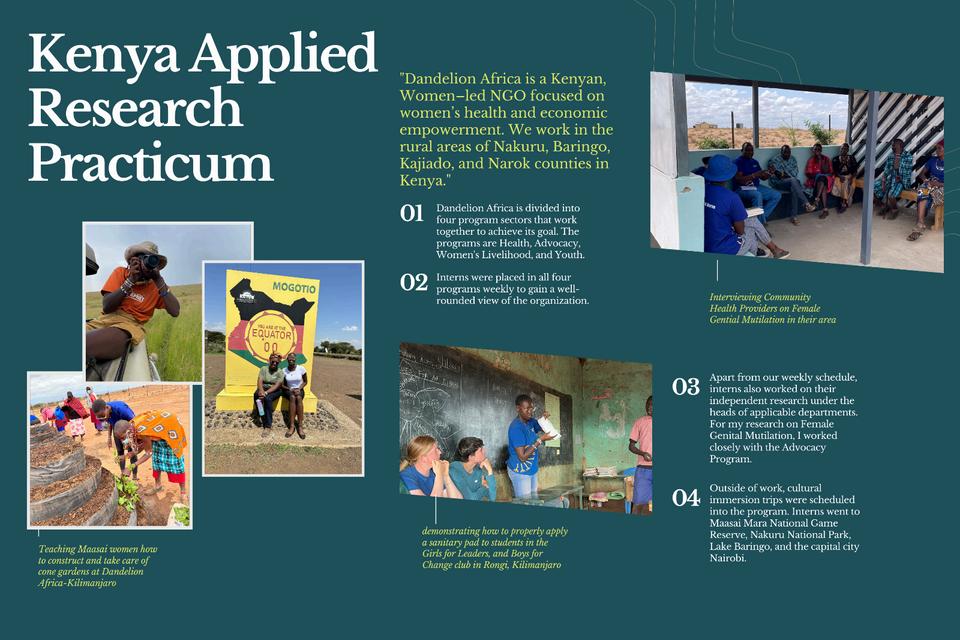

Community readiness to abandon FGM hinges on comprehensive education and sensitization campaigns
for both the younger and older generations, with special attention to those who haven’t attended school, as they often uphold the practice.
Including men and boys in anti-FGM initiatives is critical for long-lasting change.
The inclusion of male champions who advocated against FGM in their communities breaks down the gender barriers often perpetuating the practice. It makes it a community issue instead of a women’s issue. Male champions play a vital role in changing community norms by taking the lead in rejecting FGM among their peers.
Community-led anti-FGM initiatives highlight the fluidity of social norms and traditions, challenging the rigidity of culture.
When advocating against FGM, tensions arose between the older and younger generations. The older generation seeks to preserve the practice out of fear of cultural erosion or a belief that the practice is essential to the community’s identity. Some interviewees noted that moving away from FGM would signify a gradual loss of practices and celebrations.
Sustainable development, popularized by the 1987 Brundtland Report, focuses on meeting current needs without compromising future generations. In 2015, the United Nations adopted the 17 Sustainable Development Goals (SDGs) to address global challenges like poverty, inequality, and climate change by 2030.
Women play a crucial role in achieving sustainable development, as their direct experiences with social and environmental issues drive them to invest in effective solutions. When women earn an income and dictate how the income is utilized, 90% of their income is invested back into the family, compared with 35% of men. Women invest in the health (SDG 3), education (SDG 4), and nutritional wellbeing (SDG 2) of their families, serving as significant, grassroots contributors to sustainable development.
However, women in developing countries face significant barriers that limit their abilities to earn incomes, including unequal domestic responsibilities, limited access to education, and gender pay gaps. In Kenya, women-owned businesses make up about half of all micro, small, and medium-sized enterprises (MSMEs), contributing to economic growth. Yet, these businesses often remain small due to high loan interest rates and limited collateral relating to land ownership.
Initiatives like table banking in Kenya, supported by organizations like Dandelion Africa, provide women with equitable financing solutions, helping them establish and grow business and increase their incomes. This study examines the impact of table banking on income generation for women and, in turn, how women invested to reduce poverty, foster gender equality, and contribute to climate change mitigation. It explores how addressing systemic barriers can unlock women’s potential as agents of sustainable development, emphasizing their critical role in achieving global goals.
The study focused on Dandelion Africa’s table banking program and was conducted in the Nakuru and Baringo counties of Kenya. The agriculture sector, vital to rural Kenya, faces challenges due to climate change, food insecurity, and poverty, disproportionately affecting women and girls. Forty-eight participants from Dandelion’s program, aged 25-70, completed surveys to assess the program's impact on income, poverty reduction (education and food security), gender equality (confidence and public participation), and climate change mitigation (water and trees). Data was analyzed quantitatively using a 5-point Likert scale, with an emphasis on the longevity of involvement in the program. Ethics were prioritized with voluntary participation, confidentiality, and minimal harm throughout the research process.
Dandelion Africa’s table banking program positively impacted sustainable development in rural Kenya. Income-generating activities (IGAs) increased by 30%, with 90% of women who started new IGAs experiencing income growth. Women’s ability to pay school fees and keep children in school improved, with longer involvement in table banking resulting in higher likelihoods.
Food security also improved, with 64% of participants becoming food secure Confidence and public participation increased while access to clean water and tree planting grew, demonstrating the program's success in mitigating climate change and fostering sustainability.
This study assesses the impact of Dandelion Africa's table banking program on women’s income generation in rural Kenya, highlighting its role in achieving sustainable development. Results show that table banking helps women raise incomes by enabling them to start or expand income-generating activities (IGAs) through loans, savings, and business training. Despite economic challenges like inflation and GDP decline, 91% of participants reported income increases. The study also reveals that increased income improves women’s ability to pay school fees, ensure food security, and engage in climate change mitigation, such as purchasing water tanks and planting trees. Additionally, women’s participation in public forums and their confidence grew.
These findings demonstrate the link between female income generation and sustainable development, supporting gender equality and contributing to poverty reduction and climate change efforts. However, the study acknowledges that while female income generation plays a crucial role, it does not address all the complex, systemic issues of poverty, gender inequality, and climate change. Therefore, while programs like table banking are essential, they must be part of a broader strategy to tackle these global challenges. Further research and investment in microfinance programs are needed to support the SDGs and empower women worldwide.
Dandelion Africa’s table banking program significantly increased income for women in rural Kenya, with 91% of participants reporting income growth despite economic challenges. This income boost enabled women to invest in their families, improve food security, and pay school fees, aligning with the SDGs on poverty reduction and gender equality.
The program contributed to gender equality by enhancing women’s confidence and increasing their participation in public forums. These changes demonstrate how income generation can lead to broader social and political empowerment, crucial for sustainable development.
Table banking also fostered climate action, as participants used their increased income to invest in water tanks, reduce waterborne diseases, and plant trees. These actions helped mitigate the impacts of climate change, demonstrating the interconnectedness of women’s economic empowerment and environmental sustainability.

The following photos highlight key aspects of the research practicum, including data collection, community engagement, fieldwork, and cultural immersion activities.
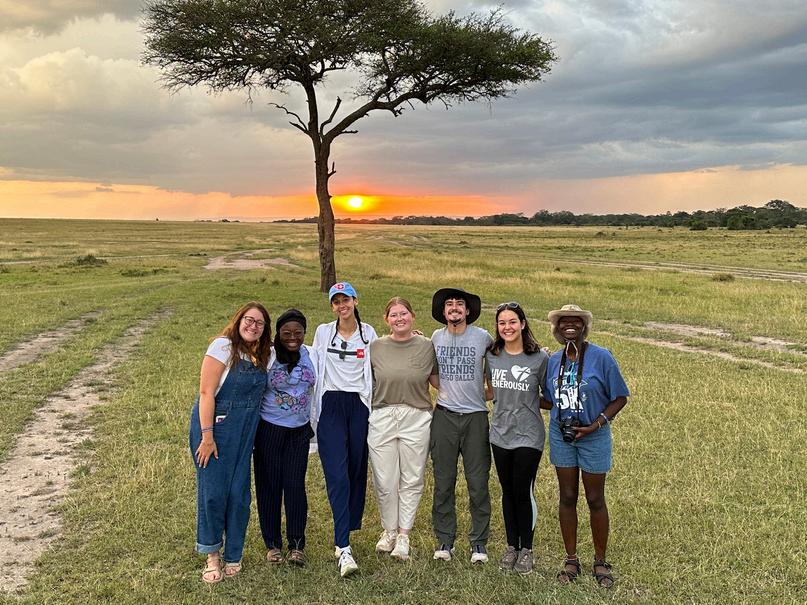





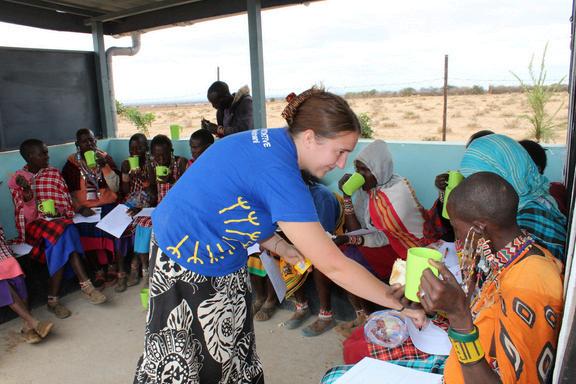
Cultural Immersion trip to Masai Mara
Cohort constructing cone gardens in preparation for a demonstration to Maasai women and men.
Maria conducting research during a Girls for Leaders, Boys for Change meeting.
Noah conducting research at Dandelion AfricaKilimanjaro
Cohort members teaching students about sanitary pads in Kilimanjaro
conducting research at Dandelion AfricaKilimanjaro
Dr. Satang Nabaneh, Director of Programs, Faculty of Practice, Human Rights Center
Dr. Natalie F. Hudson, Executive Director of the Human Rights Center
Megan Garrison, Partnerships, Outreach, and Engagement Coordinator
Photography
Mercy John and 2023 Practicum Cohort
